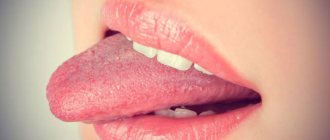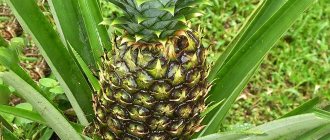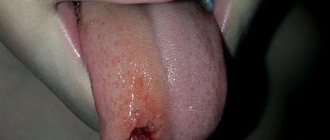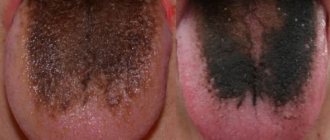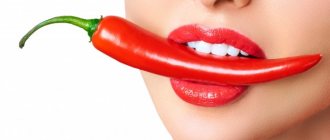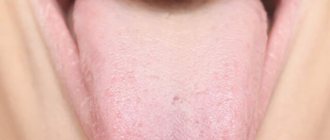Burning sensation in the mouth and tongue - causes
Local factors:
- Decreased saliva secretion. The mucous membrane becomes dry, lips and tongue crack. Food and liquid irritate the damaged areas, and they sting quite severely.
- Fungal candidiasis. Popularly known as thrush. Fungi, during their rapid proliferation (which happens when the immune system is weakened), provoke a burning sensation in the oral mucosa and painful sensations.
- Hard dental deposits. The formation of tartar is accompanied by the simultaneous delamination of old layers. The separated particles affect the mucous membrane, causing an unpleasant reaction.
- Allergy. A burning sensation in the mouth is nothing new for those with intolerance to certain foods, medications, and even denture materials.
- Leukoplakia. Excessive keratinization on any part of the epithelium usually does not provoke tingling sensations, but this disease cannot be excluded from the list of possible persons involved.
- Diseases of the tongue. Desquamative glossitis, or “hairy” tongue, is a common cause of persistent burning sensation in the mouth. The papillae become very sensitive.
- Herpetic infection. The blisters, which quickly transform into erosions, cause severe itching and unbearable burning both in the normal state and when eating.
- Grinding of teeth. Unconscious movements of the teeth during sleep, called bruxism, automatically affects the tongue with the appearance of microtraumas on it, and, accordingly, a burning sensation.
- Lichen planus. Erosive damage to the mucous membrane, white ulcers haunt the patient during an exacerbation, causing severe discomfort.
General factors:
- Unbalanced diet
- Blood diseases
- Hormonal disbalance
- Stomach pathologies
- Nervous disorders
- Avitaminosis
- Insulin-dependent diabetes
- Bulimia
In these conditions, a burning taste in the mouth may appear and disappear, as it is a concomitant symptom.
Preventive actions
To minimize any risks of developing diseases leading to the symptoms discussed above, you should take care of high-quality and regular oral hygiene. Every day, morning and evening, you should thoroughly clean not only the surface of your teeth, but also your tongue, because a huge amount of bacteria and food debris also accumulate on it. To do this, you can use a regular toothbrush or purchase a special device, such as a scraper.
Regular tongue cleaning will help avoid the problem.
As a preventive measure, from time to time you can rinse your mouth with decoctions of medicinal herbs or special antiseptic solutions, which can be purchased at any pharmacy. And do not forget about the importance of systematically visiting the dentist for preventive examinations.
- Sergeev A.O. Diagnosis and treatment of superficial candidiasis, 2001.
How does burning in the mouth and tongue manifest?
The symptom is clearly noticeable, may occur sporadically and disappear on its own. This happens when taking bitter medicines or eating spicy foods (“fire” in the mouth). A slight irritation of the mucous membrane may bother you after dental procedures; this is quite normal.
True diseases can be assumed if:
- Dryness and burning in the mouth often appear in certain areas of the oral cavity
- Unpleasant sensations intensify and are accompanied by numbness
- The tingling becomes constant
In most patients, the burning sensation manifests itself in the morning, intensifies during the daytime and subsides towards night.
Causes depending on the location of pain
Pediatric dentistry in St. Petersburg will understand every problem, find out the causes of the disease, and prescribe therapy. Provoking factors include:
- Organ damage in chronic and acute form. This could be inflammation or the negative effects of medications.
- Fungal and infectious diseases of internal organs, vitamin deficiency, dysbacteriosis.
- Poor hygiene, alcohol consumption, smoking.
- Glossitis is inflammation of the outer layers of the mucous membrane. The disease occurs due to impaired blood circulation in the capillaries. It is provoked by a burn, cut, or injury. The disease goes away quickly, as saliva disinfects the wounds.
- Streptococci, staphylococci, viruses act pathogenically.
Main forms of pathological processes:
- Galvanic stomatitis;
- Geographical language;
The first disease develops against the background of staples, braces, and occlusion. A white coating and spots with pimples appear. If the form of the disease is severe, burning, erosion, irritation, and tooth marks on the lateral planes occur.
Geographic tongue is a disease of mucous tissue of a dystrophic and inflammatory nature. Desquamations appear on the surface of the organ, that is, areas with scaly peeling. In such areas the epithelium becomes red. They are surrounded by a rim of white epithelium, which peels off. The disease appears against the background of improper tissue nutrition, gastrointestinal diseases, and during the eruption of incisors, fangs, and molars.
The tip of the tongue hurts
The tip of the muscular organ is rich in taste buds and nerve plexuses. The ducts of the salivary anterior glands exit into this area. Every component can be damaged. If the tip of the tongue hurts, you can assume:
- Damage from trauma;
- Negative influence of physical factors;
- Allergies;
- Development of inflammatory processes;
- Glossalgia;
A child can be injured by hasty eating or inept use of cutlery. An accidental bite may cause bleeding. Damage is caused by salty, spicy foods, low and high temperatures. In such cases, children complain of pain and numbness. With reduced immunity, inflammation often develops. The aphthous form of stomatitis, which is caused by pathogenic agents, is often diagnosed. The disease manifests itself as deep ulcers, at the bottom of which plaque with a white tint accumulates. They heal slowly. Children's temperature rises and they feel unwell.
Viral pathogens cause herpes disease. The mucous membranes of the oral cavity are covered with colorless bubbles. After opening, ulcers form in their place and bleed. The baby may develop a fever.
The frenulum under the tongue hurts
If your child has pain in the frenulum under the tongue, you need to see a doctor to find out the cause of the problem. The main provoking factors are:
- Initial period of stomatitis;
- Incorrectly chosen mouthwash, brush or paste;
- An hysterical cry the day before, active singing;
- Microtraumas;
- Inflammation that appears as a result of an allergic reaction or enlarged lymph nodes;
- Caries, an infection of the gum tissue;
Problems arise due to a short frenulum. Insufficient ligament length can be corrected with conservative therapy or trimming. Specific gymnastics helps recovery: rolling a muscle organ into a ball, folding it into a tube. Exercises help stretch the ligament. Surgery is performed at any age, preferably in preschool. It is optimal to operate the ligament in infancy, since newborn children easily tolerate such manipulations.
Pain at the base of the tongue
Inflammation of the gums in a child is an unpleasant disease. The baby becomes capricious, whiny, his temperature may rise, and his appetite disappears. The sooner the parents show the little one to the doctor, the easier and faster the therapy will be. Children often complain of pain in the root area of the speech organ. This can happen when:
- The area of the base of the tongue is injured: wounds, injections, cuts. Children often suffer from foreign objects entering the oral cavity. If the injuries are serious, they are treated in a hospital.
- A viral or bacterial infection enters the body. The surface of the tongue becomes covered with ulcers and blisters. They interfere with swallowing food and speech. The pathology covers the tonsils, pharynx, and larynx.
- The salivary glands become clogged, which interferes with the swallowing process.
- Medicines are used uncontrollably.
- Neuralgia, allergies, anemia develop, and hormonal disorders appear.
Chronic diseases can be associated with failure to comply with hygiene rules. In any case, parents need to show the child to a doctor for medical care.
Diagnostics
How to find out what exactly caused the burning sensation in the mouth and tongue? Only a specialist can determine the reasons. First you need to visit the dentist. If there are no visible local causes that could cause this problem, you need to go to a therapist. The patient will be prescribed tests (urine, blood - general analysis and sugar, biochemical studies). It is necessary to exclude sexually transmitted diseases and AIDS. It would be useful to consult an endocrinologist - perhaps it is due to hormonal fluctuations. Based on complete information, a preliminary diagnosis can already be made. Get ready for the fact that at the same time you will have to visit a gynecologist, nutritionist, infectious disease specialist, oncologist and doctors of other specialties.
Language functions
In order to find out why pain in this muscle organ may occur, it is necessary to understand its purpose. So, the functions of the language are as follows:
- Protective. The tongue prevents the penetration of germs and viruses through the mucous membrane.
- Sensitive. This organ is responsible for the sensitivity of tactile, thermal, pain and taste sensations.
- Plastic. The tongue helps to quickly restore cells and the upper layer of skin in case of mechanical damage.
- Suction. With the help of this organ, various substances enter the human body.
Language is a universal mechanism. It has a direct impact on the functioning of our body. That is why he needs to constantly pay attention and regularly care for him using hygiene procedures.
From the point of view of anatomical structure, the tongue is a muscle, on top of which there are many nerve endings, glands, fibers, papillae and taste buds. This organ has a direct connection with the gastrointestinal tract and affects its functioning. Our voice timbre also depends on the language.
This organ consists of two parts that do not have a clear boundary between each other. One of them is the back one. This is the root of the tongue, which on one of its sides fuses with the oral mucosa. The front part is the body. She is able to move freely in different directions. The upper surface of the tongue is called the dorsum.
This organ can be described as a litmus test, indicating the presence of diseases and malfunctions of various internal organs.
Burning mouth - treatment
The main goal is to eliminate the root cause found at the diagnostic stage. If it is not associated with dental pathology, the oral cavity is sanitized, worn fillings are removed and new fillings are placed, and dentures are corrected. Stomatitis and glossitis often require antibiotics. Candidiasis is treated with antifungal drugs.
General diseases are treated by a doctor of appropriate specialization, prescribing complex treatment depending on the type of pathology. Measures are being taken to improve immunity, normalize stomach function, stabilize blood glucose levels, and treat neuroses.
At home, you can alleviate the condition by rinsing your mouth with warm infusions of oak bark, sage, and chamomile. 1 tbsp is enough. per standard glass of water. Brew like tea, let cool and rinse your mouth 2-3 times a day. To prevent a burning sensation in the mouth, avoid or at least minimize spicy foods and caustic ingredients in your diet; it is better to avoid alcohol altogether.
Treatment of viral stomatitis
Pediatricians advise parents, in cases where they have the slightest suspicion of this pathology, to urgently show the baby to a doctor. And despite the fact that the treatment of viral stomatitis is simple, inaction by adults can aggravate the situation.
The pediatrician will examine the little patient, make a diagnosis and prescribe effective medications.
If viral stomatitis is the reason that a child’s tongue hurts, what should be done to relieve the child of discomfort? Strictly follow your doctor's recommendations. Parents should know that antibiotics are not prescribed for the treatment of this pathology. Pediatricians recommend vitamins and immunomodulatory drugs to young patients. And only in cases where stomatitis enters the relapse stage, a specialist can prescribe potent medications.
If this particular pathology causes a child’s tongue to hurt, what should parents do? They should give their child plenty of water. This will prevent dehydration. The fact is that with stomatitis very severe intoxication is often observed. And if the body continues to lose fluid, the baby will soon become lethargic.
Local methods are also used to treat stomatitis, one of which is rinsing. For this procedure, prepare a solution of potassium permanganate (pale pink) or an infusion of medicinal herbs such as sage and calendula. You can use decoctions of oak bark and chamomile. However, if a child’s tongue hurts at 2 years old, then it is very difficult to carry out similar procedures with him. For such children, doctors prescribe treatment of the mucous membranes with special sprays.
During the period of illness, the baby’s daily diet should include liquid or semi-liquid foods, various purees, cereals, as well as milk and yoghurts. Fish and meat are used only after grinding them in a meat grinder. In addition, if a child’s tongue hurts, then he should not be given cold, sour and hot drinks, chocolate and sweets, citrus fruits and solid foods.
Treatment of aphthous stomatitis
Pediatricians point out to parents that the correct therapy for a child can be prescribed only after a comprehensive examination with the participation of a dentist, allergist and gastroenterologist. But in any case, local treatment will be needed.
What should be done when diagnosing aphthous stomatitis in a child?
To alleviate the suffering of a small patient, doctors can prescribe him the drug “Vinilin”. This remedy is also called Shostakovsky's balm. Pediatricians consider this drug to be an effective antiseptic that produces a regenerating and antimicrobial effect. The product contains a substance such as polyvinox. Its action is aimed at disinfecting the mucous membrane, excluding re-infection of damaged areas. At the same time, the drug “Vinilin” is able to eliminate pain and accelerate tissue regeneration. The balm is applied to the sores, having first applied it to a gauze napkin.
A strong antiseptic that has a remarkable anti-inflammatory effect is also a remedy such as Iodinol. It is mixed with water and used as a rinse.
For children older than one year, pediatricians may recommend Cholisal (gel). Along with the anti-inflammatory effect, this remedy also has an anesthetic effect. Apply the drug to the affected areas of the tongue, squeezing a small strip out of the tube and carefully distributing the gel on the mucous membrane.
In addition, for aphthous stomatitis, pediatricians prescribe drugs that increase local and general immunity, as well as vitamins.
Aphthous stomatitis
Why does my baby's tongue hurt? The cause may be aphthous stomatitis. Indeed, with this pathology, painful ulcers form on the tongue, as well as on the inside of the lips and cheeks. They are represented by a yellowish-white center, which is surrounded by an inflamed red stripe.
Pediatricians cannot pinpoint exactly what is the cause of this disease. As a rule, pathology develops due to such provoking factors as:
- allergies (drug, microbial and food);
- disruptions in the functioning of the immune system;
- chronic pathologies of the gastrointestinal tract;
- staphylococcal infection.
The main symptoms of aphthous stomatitis are:
- burning and itching on the mucous membrane;
- temperature increase;
- child's refusal to eat;
- the formation of a cloudy film on the surface of the ulcers.
Treatment of herpetic stomatitis
Pediatricians do not recommend parents to independently diagnose their baby’s condition. If they have symptoms of the disease, they should consult a doctor. Only he can make the correct diagnosis.
Antiviral drugs taken orally are used to treat herpes stomatitis. Acyclovir is a fairly effective remedy, according to pediatricians. It should be given to the child for a week 4-5 times a day, 200 mg. In particularly severe cases, this drug is prescribed for intravenous drip administration.
Such treatment should be accompanied by local treatment of ulcers. For this purpose, drugs such as Zovirax and Oxolin are used. You can also lubricate the sores with sea buckthorn oil applied to a cotton swab. To reduce the level of intoxication in the body, pediatricians recommend taking immunoglobulins in the form of “Viferon” and “Anaferon”.
